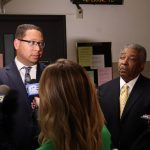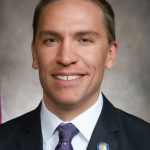Gov. Evers, Several Great Lakes States’ Governors Commend Bipartisan Collaboration in Washington to Address PFAS
MADISON — Gov. Tony Evers joined the governors of Michigan, Minnesota, New York, and Pennsylvania in support of the PFAS Action Act, bipartisan federal legislation the U.S. House of Representatives voted to approve this week. This comprehensive legislation would help accelerate the enactment of national public health and environmental protections from PFAS. The governors signed a letter of support for the PFAS Action Act.
“If history is to be a judge of our future success in addressing PFAS, we need to enact strong, comprehensive federal legislation, coupled with sufficient authority and resources for the states to successfully address the challenges posed by PFAS contamination in our states and across state boundaries,” the letter reads.
Wisconsin, Michigan, Minnesota, New York and Pennsylvania have engaged in efforts to strategize and collaborate between states to address PFAS. Wisconsin continues to move forward to develop environmental standards and take actions to make sure that all Wisconsinites have safe drinking water.
The letter of support stresses the key areas in which federal action is especially needed, including designating PFAS a hazardous substance under the Comprehensive Environmental Response, Compensation and Liability Act (CERCLA), the development of national standards for water and air as well as PFAS management guidelines, funding for impacted communities and product stewardship.
The letter also reflects the Great Lakes states’ shared commitment to addressing PFAS in the environment and protecting public health and encourages Congress to take action as we move forward in tackling PFAS contamination across the country.
NOTE: This press release was submitted to Urban Milwaukee and was not written by an Urban Milwaukee writer. While it is believed to be reliable, Urban Milwaukee does not guarantee its accuracy or completeness.
More about the PFAS Problem
- PFAS Levels in Great Lakes Fish Are Dropping - Danielle Kaeding - Feb 6th, 2026
- Gov. Evers and GOP Lawmakers Near a Deal on PFAS Pollution - Danielle Kaeding - Jan 22nd, 2026
- Gov. Evers Optimistic About Reaching Final Deal With Republican Lawmakers to Secure Release of $125 Million in Long-Awaited Pfas Investments - Gov. Tony Evers - Jan 21st, 2026
- Bipartisan Push to Tell Counties Faster When Water Tests Fail - Henry Redman - Dec 19th, 2025
- MKE County: County Seeks to Sue PFAS Producers, Oil Companies - Graham Kilmer - Dec 10th, 2025
- Wisconsin Reviewing EPA-Approved Pesticides For PFAS - Danielle Kaeding - Dec 9th, 2025
- State Nears Settlement with Johnson Controls/Tyco Over PFAS Spills - Danielle Kaeding - Dec 4th, 2025
- Senate Bill Promotes Soybean-Based Firefighting Foam to Replace PFAS - Danielle Kaeding - Dec 2nd, 2025
- Test Results Show High PFAS Levels in Wisconsin’s Landfill Runoff - Danielle Kaeding - Dec 2nd, 2025
- Wisconsin Communities Get $282 Million for Drinking Water Projects - Danielle Kaeding - Nov 19th, 2025
Read more about PFAS Problem here
Mentioned in This Press Release
Recent Press Releases by Gov. Tony Evers
Gov. Evers, DWD Award $250,000 in Commercial Driver Training Grants, Bolstering Statewide Driver Workforce
Feb 24th, 2026 by Gov. Tony EversGrants support businesses and organizations in eight counties across the state that offer training for in-demand driving occupations






















